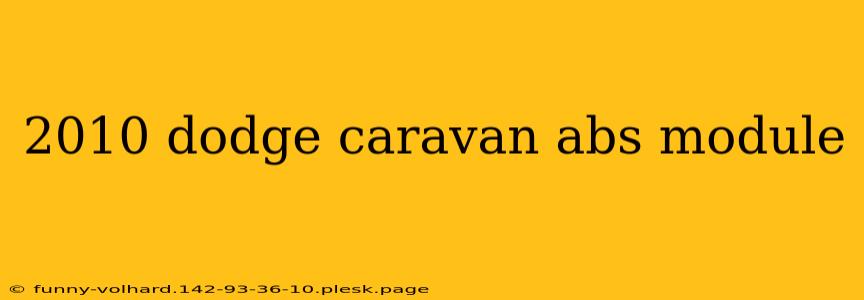The Anti-lock Braking System (ABS) is a crucial safety feature in any vehicle, and the ABS module is its brain. When your 2010 Dodge Caravan's ABS system malfunctions, it can lead to a loss of braking control, especially in slippery conditions. This guide will help you understand common problems with the 2010 Dodge Caravan ABS module, troubleshooting steps, and the process of replacement.
Understanding the ABS Module in Your 2010 Dodge Caravan
The ABS module is an electronic control unit (ECU) responsible for monitoring wheel speed sensors and activating the ABS pump when necessary. This prevents wheel lockup during hard braking, maintaining steering control. A faulty ABS module can manifest in several ways, impacting both your safety and your vehicle's drivability.
Common Symptoms of a Failing 2010 Dodge Caravan ABS Module
Several symptoms can indicate a problem with your 2010 Dodge Caravan's ABS module. These include:
- ABS Warning Light Illumination: The most common symptom is the illumination of the ABS warning light on your dashboard. This light indicates a malfunction within the ABS system.
- ABS Inoperative: The ABS system might completely fail to function, resulting in potential wheel lockup during braking.
- Brake Pedal Pulsation: While not always indicative of a module failure, erratic brake pedal pulsation, especially during braking, can be a symptom. This often accompanies other ABS-related issues.
- Diagnostic Trouble Codes (DTCs): A professional diagnostic scan can reveal specific DTCs related to the ABS module or its associated components, providing more specific information about the fault.
Troubleshooting Your 2010 Dodge Caravan ABS Module
Before considering a replacement, systematic troubleshooting is vital. Here's a breakdown of steps to take:
Step 1: Check the Fuses and Relays
Start by inspecting the fuses and relays associated with the ABS system. A blown fuse or faulty relay can mimic symptoms of a failing module. Consult your owner's manual to locate these components.
Step 2: Inspect the Wheel Speed Sensors
Faulty wheel speed sensors can send incorrect information to the ABS module, leading to malfunction. Inspect the sensors for damage, corrosion, or loose connections.
Step 3: Professional Diagnostic Scan
A professional mechanic can perform a thorough diagnostic scan using an OBD-II scanner capable of reading ABS system codes. This will pinpoint the specific problem, saving time and potentially avoiding unnecessary repairs.
Step 4: Assess the Wiring Harness
Check the wiring harness connecting the ABS module to other components for any damage, breaks, or corrosion. Damaged wiring can disrupt communication and lead to malfunction.
Replacing the 2010 Dodge Caravan ABS Module
Replacing the ABS module is a complex procedure that should ideally be performed by a qualified mechanic. The process involves:
- Disconnecting the Battery: Always disconnect the negative battery terminal before attempting any electrical work.
- Accessing the Module: The ABS module's location varies depending on the trim level and configuration. You might need to remove some under-dash components to access it.
- Unplugging Connectors: Carefully unplug all connectors attached to the ABS module.
- Removing Mounting Bolts: Remove the module's mounting bolts.
- Installing the New Module: Install the new module, ensuring all connectors are properly seated.
- Reconnecting the Battery: Reconnect the battery.
- Bleed the Brakes: After installation, the brake system might need bleeding to remove any air introduced during the process. This is crucial for optimal brake performance.
Choosing a Replacement ABS Module
When sourcing a replacement ABS module, ensure you obtain a genuine Chrysler part or a high-quality aftermarket equivalent. Using a low-quality part could lead to further issues. Verify compatibility with your specific 2010 Dodge Caravan model and trim level.
Disclaimer: This information is intended for educational purposes only and does not constitute professional automotive advice. Always consult a qualified mechanic for diagnosis and repair of your vehicle's ABS system. Improper repair can compromise your safety.

